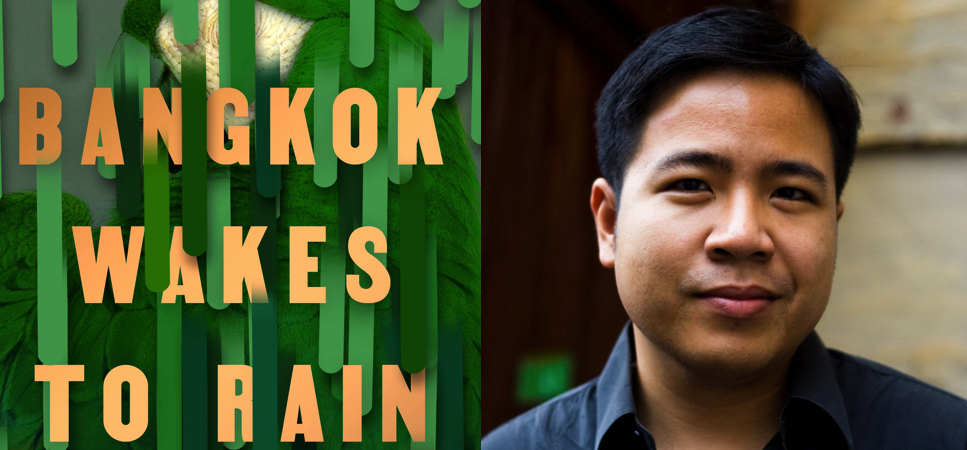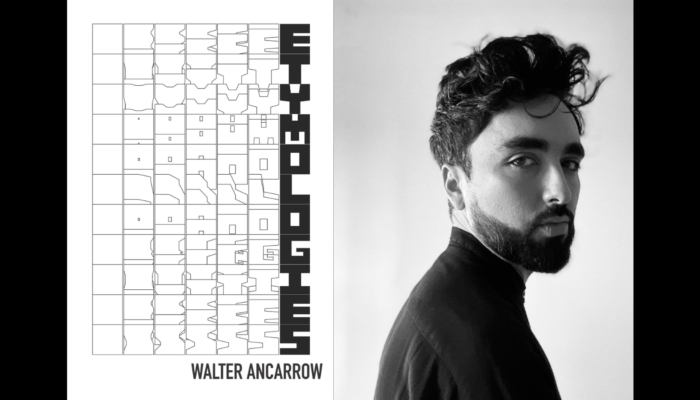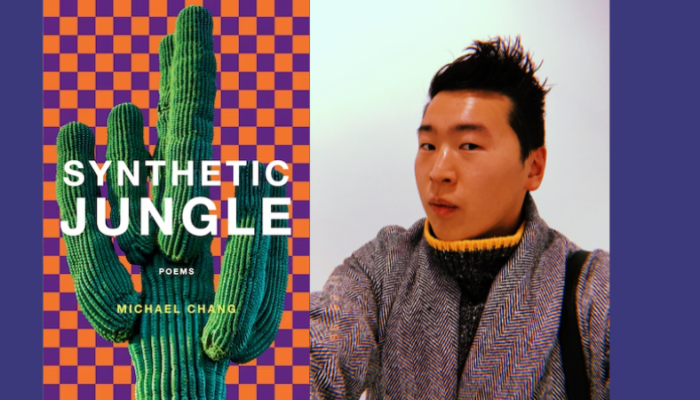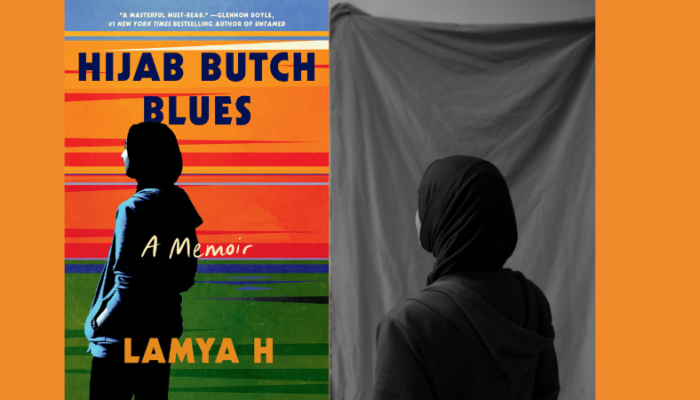An Interview with Pitchaya Sudbanthad
In his powerful debut novel, Bangkok Wakes to Rain, Pitchaya Sudbanthad creates a timeless portrait of a city. Spanning several decades, numerous viewpoints, love stories, family spats, violent political protests, and drastic environmental changes, Bangkok Wakes to Rain is a stunning novel, crafted with an entirely unique narrative structure. Characters walk in and out of chapters, sometimes decades later, and Bangkok—a character in and of itself—remains resilient in the face of historical and environmental changes; the old Sino-colonial mansion at the center of Bangkok Wakes to Rain is not knocked down—rather, a luxury high-rise is built around it. And when rainfall escalates, the city is flooded, new houses stand on stilts, and only the tips of submerged skyscrapers and pagodas poke out over the water. Throughout Bangkok Wakes to Rain, Sudbanthad makes you question the sanctity of place in an increasingly urgent manner. What will happen to cities and homes as the climate changes? Is there space for collective resilience? Can art speak to this resilience?
Pitchaya and I spoke about the impact of place on a writer, Western orientalist narratives, and how we take cities for granted in the current reality of climate change. We also discussed fountain pens. There was so much more I wanted to discuss, as Sudbanthad’s writing is endlessly multi-layered, emotionally complex, and wildly inspiring. As I’m attempting to finish my own first novel, Sudbanthad’s advice on how emerging writers can power through such a task stays humming—soothingly, inspirationally—in my head. Pitchaya Sudbanthad is a remarkable talent, and I’m excited for readers to dive into a novel as rich, complex, and accomplished as Bangkok Wakes to Rain.
—Mina Seçkin, Managing Editor
Mina Seçkin: When did you start writing? Do you feel like there was a particular moment in your life when you considered yourself a writer?
Pitchaya Sudbanthad: People often ask the origin story question, and I think it’s difficult for many writers to pinpoint any exact time. Maybe some writers do have these epiphanies in which the idea of writing clearly arrives to them. For me, I feel like I’ve always been a storyteller of sorts. As an only child, I spent a lot of time by myself. When I was younger I would record my own radio shows for an audience of one. So even at that age of five to ten, I was constructing narratives, albeit only for my own amusement, trying to do the comedic thing, the reportage thing, talking about things I don’t even remember now. I think that narrative urge has stayed with me. I also gravitated towards other art forms. I used to draw and was more of a visual artist than I am now. When I came to New York, I had delusions of painting that I thought I could fulfill. Eventually, I found writing to be the narrative form that was most fruitful and possible for me, and I just kept on doing it, while others fell by the wayside. I was able to maintain the discipline of writing. I think that’s the hardest thing, and not just for writers. If you’re a musician, you have to be in the rehearsal room. Or if you’re making, say, textile art, you’re on a loom, and you have to be wherever the loom is. With writing, I have the advantage of being able to write while taking the subway or eating lunch.
MS: What is your discipline in writing? How do you make yourself go to the rehearsal room?
PS: I try to write every day. Sometimes I’m successful, sometimes I’m not, but even just sitting down and putting myself in a kind of mindfulness about writing helps. I also try to derive my own personal joys from it. I write by hand, and I have a small fountain pen collection that I maintain; I get them for cheap on eBay, and I restore them. I have particular notebooks. I compartmentalize my space for writing. Whether I’m working on my novel or writing nonfiction, I use separate pens, separate notebooks. I think it helps. You trick yourself into doing the thing that you might not necessarily feel like doing. Because there are distractions that will always get in the way, you create a little self-enticement. You do what you can.
MS: A reward system.
PS: Yes, by undertaking your own Pavlovian conditioning.
MS: Can you talk about your inspiration for this novel?
PS: It’s very hard to specify any one inspiration. I think this novel is the product of my shuttling back and forth from Bangkok, where I was born, and elsewhere. Each time I’m back, I’m reinserted to this place that I’m familiar with yet also distant. And Bangkok is very assertive—the city just comes at you. You arrive, the heat is thick, and you’re wading through this heat. It’s a 24-hour city with 24-hour traffic jams, food stalls, people everywhere. And on your way from the airport, you almost feel like a tourist. But then you’re home and enjoying this bowl of rice porridge that your mom has cooked for you, and the people that you grew up with are there. The house that you knew is there. So, my characters similarly bear witness to place and its changes.
MS: I felt the connection to Bangkok most in the stories that were set in a different city. When Sammy was in London but was remembering the house in Bangkok, that distance was captured very well. Do you go back to Bangkok often?
PS: Yeah, I spend two or three months of the year there. When I was in school, I would spend every break in Bangkok. Even though I’m not there all the time, I return to the city and fit right back into my slot with my family. But I still divide my time between here and there. I’m always arriving at a different place, which I think promotes ambiguity in negotiating different identities of Thai, American, Thai-American, American-Thai. It’s a weird, privileged freedom to be able to do that. It’s also very difficult.
MS: How many times—if ever—did you start your novel over? Either with respect to the perspectives you chose, or your choice to use the third person? Or were you sure of the very precise architecture from the beginning?
PS: I go about doing things often without any idea about what I need to do. A lot of it is experimentation. You’re going down a certain path, and then at a certain point, you stop yourself and veer a different way, and then another. Before something becomes a novel, there is usually a larger novel that had been written, which had so many different branches and other potentialities, and then at some point you discover the truer shape of what you need to write. The way that I had written this was by trying to uncover many ways into a book. With all these different arcs, I thought, this could be a book, or, oh, this could be a book. But eventually all these narrative threads reached for each other, and it worked out in its own organic way. I touch on jazz music very lightly in the novel, and I compare it to the improvisation there. Listening to narrative rhythm and playing on motifs. All of a sudden, something sends you in a direction that has resonance with something that you wrote before, and you go with it.
MS: The way you found your novel’s structure is fascinating and says a lot about what they tell you a book should look like, and what a book can actually look like: something that doesn’t have to have a linear plot or a simple narrative.
PS: Yeah, I think it’s good to read how other people write. When you’re a visual artist you go to the museum or galleries, and then you have to find your own path. I have the benefit of being all over the place in my interests, so I’m a writer and reader, but I also find myself inspired by other art forms—painting, jazz, any kind of music. Even television shows. They’re so advanced in their storytelling right now, structured in such intricate ways that they make what we used to think of TV shows ten or fifteen years ago simplistic in comparison. I feel it’s productive to look to the rich world outside of literature, as well.
MS: Did you find that any particular section was harder to write than the others?
PS: It’s all hard. There’s no easy section. But once you’ve written a good chunk of the book, parts of it will seem more natural because things have been constructed a certain way. You are almost compelled by your own writing to go in a certain direction, but sometimes you also have to ask yourself, is this the right direction? I wrote three different ways that the book could have come to an end, and each time I thought, this is the way! And then changed it, thinking, this is the way! It was long before I arrived at something that I was happy with.
MS: How did you know when your novel was done?
PS: Often people don’t finish writing a book because to get done is to face the reality of it being read by other people. You have to concede the book in some way to the larger world. It’s a frightening thing. For me, at some point, I just knew that I had taken it as far as I could, and I needed an editor. Because you can whirl around in a circle until you become this tight circle that spins in place, and you could go on spinning like that forever. Or, you can think, you know, maybe I could do something different or create a different trajectory. And often you’re the last person to see that. So I’m very lucky to have had a capable editor when I had a full draft, and also, earlier, when I was writing parts of it, very valuable suggestions from trusted friends.
MS: That’s really helpful. That whirling around is scary.
PS: Yeah, you could go whirling around forever. Maybe you could create a new Guinness world record of whirling. But you won’t have a finished book.
MS: Did you know that your novel was going to end up in a sort of dystopian time and place, with Bangkok having been flooded? Those sections were so vivid—especially the chapter that follows the group of teenage girls who boat tourists around the waterlogged city.
PS: That was just something that emerged. And because it made sense with the rest of the book, I went with it. We live in this age where we have no idea what’s going to become of all these cities and places that we take for granted as these dry, viable urban areas. I could have taken the book to a much more dystopian place, but I wanted to portray resilience, something I’ve personally seen with disasters and the reaction to them. After 9/11 in New York, and having seen the 2011 flooding in Bangkok, and also Hurricane Sandy, and how that affected people. I was a volunteer at an evacuation center, where people’s lives were in disarray, but I also noticed the opposite urge to return to normalcy. To play, to walk their dog, to watch a movie. I think after catastrophe, there’s also a lot of space for people to be generous or try to live out a normal life as best as they can. They’re working. They’re living. They’re listening to music. They’re doing things that are of the life and civilization they once had.
MS: Yeah, art that focuses on that resilience. Do you think that’s more helpful? For the future?
PS: I don’t know.
MS: Will it make things better?
PS: I mean, I hope I’m not sugar coating anything. The science is pretty clear. There will be difficult times, if we don’t work now to avoid catastrophe. I can’t say how much my novel will contribute in terms of larger global shifts to that kind of necessary work. Perhaps it won’t have any effect. But I did raise my hand and shout.
MS: How did you decide to organize the chapters? Did that come at the end? Or did you have an idea of the order throughout?
PS: In some ways it was like recording an album. I have my sequence of songs. And I played it in my head. I would take my manuscript and I would quickly skim through it, playing back the book like it was an album. And if it didn’t make sense, I shifted things around. Or I’d discover that I needed another chapter, or that something was amiss and I needed to go back within a chapter and change something. All these things come out in revision. Revision is the only way forward.
MS: That’s so interesting that you say album. As I was reading, I thought of those shorter chapters—especially the chapter following the birds—to be, say, forty-four second interludes between a three-minute song in an album.
PS: Yeah, movements, as I usually think about it.
MS: That’s really cool. Who are your influences?
PS: Oh wow. It’s hard to say. I have the privilege to having been exposed early on to a wider cast of international literature. So anyone from Sebald to Ishiguro to Ursula Le Guin. So these are people who I was reading and admire well before I started writing the book. So in some way, my writing was likely influenced by them. And once I knew the book was going to have multiple narrators and a non-linear structure, I looked at other people who have done similar things, from David Mitchell to Jennifer Egan to Anthony Marra. I think mine is another variation of how you can play with different narratives and create order from structural chaos.
MS: And unlike those novels, yours is set in a particular place, which is such a strong link.
PS: Yeah, pragmatically, when you have something that encompasses such a wide timescale, and touches on so many different lives, having an anchoring point is a good device to help out the reader.
MS: A physical anchor.
PS: Yeah, and something like a house is more than even a physical place. It’s also a store of memory, of what has passed and what has remained. Something about that notion was helpful for me. A place is where I often begin. Maybe it’s because I’m a person of many places, so I’m more sensitive to how place plays in our lives and my characters’ lives. I’ve compared it to a stage where my characters enter and exit.
MS: I was blown away when I read that the house was inside the new modern building.
PS: Yeah, this is a funny thing. I had a conception of old and new, somehow creating this cohesive balance. And I thought, is there a house like this in Bangkok? And there actually is one. And it’s this house that was probably owned by a wealthy merchant, maybe eighty or a hundred years ago, and then became a Russian embassy, and then a beautiful ruin. Now you see it, and there’s a building that pops up right behind it. So I thought, wow, I’m not totally far off. It’s not as intricately integrated as the way the house in my book is, but I thought it remarkable to find a similar house that has a tall glass and steel and concrete outgrowth from an old, Sino-Portuguese style mansion.
MS: Outgrowth is a great way to describe it. I also loved how, although your novel centers on a city, you didn’t write a travel-101 for readers. Did you think about this consciously? The politics of writing about a city that Americans might exotify?
PS: I’d say I wrote the book out of my own curiosity, following the different threads that came to me. A part of it might also be a reaction to other things written about the city. I’ve read a lot of fiction written by Westerners in Bangkok and I experienced, pretty much, dissatisfaction. On the one hand, you have a city of millions with different kind of lives—doctors, schoolchildren, musicians, nurses—but it’s faded to make room for this orientalist gaze of a city reimagined to only be made of brothels and opium dens and other things that, for a Western male writer, are alluring. It makes for a weird caricature of a city and a people. Sure, there are undercurrents of that world in the city, and you can certainly find it if you seek it. But for the larger population of Bangkok, this is not our lives.
And then, like you said, there are other novels that read more like a travel guide. Everything is explained. Even though I wrote this book in English, I also wrote it with Thai readers in mind, so I’m not, say, having to explain what a certain festival is that someone can find out with a quick internet search. Most of the time I call the city by its Thai name, not the name on colonial-era maps that no one from Krung Thep calls the city by.
MS: I found that Phineas’ chapter reclaimed that past, and that trend of orientalist novels.
PS: That one was me trying to be a little subversive against Western literary norms. It isn’t going to be this white male character—perhaps portrayed by Tom Cruise in the movie adaptation—arriving in a foreign place and all of a sudden magically doing indigenous things so well so as to save the poor natives. So, here’s a different take.
MS: It’s frustrating.
PS: Yeah, it’s a classic trope. The fish out of a water. But for the people who are not of the water, they’re like, yeah, this is our lives.
MS: How did you research the parts that were in the past?
PS: Lots of poking around. When I go back to Bangkok I frequent bookstores, and I’m compulsive about picking up books. There are many bookstores in Thailand, but they’re seemingly not connected to a warehouse system the way they are here. So if you find a book that interests you, you buy it, or else you’re unlikely to see it again. I’ve accumulated all these books in Thai about Thai history, and certain things stayed with me.
Then there’s good old internet research. All of a sudden, you’re pulling scans of Baptist Missionary accounts from the 1850s. and you think, oh there’s so much interesting stuff here. And you find views of foreigners looking at Thailand from the inside and from the outside, and also Thais looking at our own lives and history from the inside, and sometimes from the outside as well. You get all these different views of Thailand and Bangkok. It’s very tempting to write a single, linear narrative but when you see all these views of a place, one doesn’t feel enough—for me, at least.
MS: Do you ever worry that a Thai person from Bangkok will think, this is not my Bangkok?
PS: I do think about that, and I can’t claim to be the Thai writer. I can only be a writer of my own imagination of my city, grounded within my own perspective of being a person who has been within and without Bangkok, and a hybrid of native and visitor. I think my characters—some, at least—have that perspective as well.
MS: What question have people asked you the most so far?
PS: People have been curious about my arrangement of my chapters, and the structure, and the rationality, if there is any, behind the structure. Which is so funny to me, because—I feel like other people also do this, but I’m glad people ask this. It means they are curious.
MS: Well, your novel is very architecturally sound!
PS: I feel that that’s also the benefit of working with a terrific editor at Riverhead Books. My dad’s an architect, and he’ll design a building, and the engineer looks at it, and says, this building is going to structurally fail. So he designs it, and the engineer comes in and makes sure everything is structurally viable. An editor plays that engineer role, keeping the vision and spirit of the writer intact while making sure the work doesn’t collapse on itself.
MS: Wow. That’s beautiful, and very true. What do you want people to leave this book having experienced?
PS: Wow. I don’t know. It’s hard to say because you’re a writer, you put this thing out into the world—and people have said this before—but you only provide a half-piece of it. And it’s near impossible to predict how people will react to this work. You have that as a given. So I leave it pretty open.
MS: One last question. What was the hardest thing to overcome in writing a first novel, and what advice would you give aspiring writers?
PS: The hardest part is you never know if you’re good enough. It traces back to what you were asking before, to the question, when can you call yourself a writer? It’s still hard for me to say that sometimes. I’ve heard that even novelists who have published three, four, five, ten novels still feel the uncertainty of starting something new. I would say embrace the uncertainty and let your curiosity take you places. And, at a certain point, you have to revise and revise and revise until you’re done.




